- Home
- Alex Archer
The Matador's Crown Page 10
The Matador's Crown Read online
Page 10
“I could use one of those.”
The matador chuckled. “I was hoping you’d arrive before Señor Braden returns,” he said, turning the cape in a swishing manner, not looking up at her. “I always prefer time alone with a beautiful woman.”
“Thank you. You don’t think the skirt will hamper the lesson?”
“It’ll handicap you, but I’ve seen women perform capework while wearing much the same. Just don’t allow a horn to hook the fabric.”
As the torero moved the cape back and forth in graceful sweeps as if getting the feel for the fabric, Annja cast a glance over the estate. “So all this land is yours? To the sea?”
He nodded. “Family land for centuries. My father was a torero and his father before that. And before that, the Bravo family raised fighting bulls on land off the Bay of Cádiz. They weren’t prime bull for fighting. Bad maternal blood gave them a habit of skittishness and cowardliness. Which is why the family switched to pursuing the cape instead of the bull.”
“Garin explained you select the bulls you fight beforehand. How do you recognize a cowardly bull from a brave one before it enters the ring?”
“Ah, that’s not so easy.” He tucked the cape under an arm to use both hands to gesture as he spoke. “Usually both are quite similar before entering the ring. Only after the animal is presented with the challenge of the moving cape does it decide to either stand and charge or stir the dirt with a hoof and snort and put on a cowardly display. I do not like a gutless bull.”
“Would make it difficult to do the job of showing the audience both your skill and the bull’s skill.”
“Oh, yes, very difficult.” Manuel held the cape regally, arm out squarely and jaw lifted. “I enter the ring to show the crowd how brave the bull is. Everything I do is designed to display its bravery and give the animal the opportunity to defend its life.”
“I saw that while you fought yesterday. And yet…” She wasn’t sure how to ask without offending him, but curiosity niggled at her.
“Annja, ask. You have questions about the art of the bullfight? Doubts? Concerns? There is nothing I haven’t heard.”
“You know the bull is going to die when it enters the ring. You have that advantage.”
“Not so. Man and beast enter the ring with equal chance to live or die.”
“Okay. Yet how can the animal die a noble death when you and your assistants keep wounding it, wearing it down to exhaustion? There’s very little competition.”
Manuel gave her a look over his shoulder, yet he assumed a classic matador stance. “Am I not wearied, as well? Accompanying the physical strain, the mental toll is immense when a man must stand before his death daily. Yet if all goes as desired, both competitors give their all to the fight.”
“But you’ve got to reserve your strength for the next fight, and the next. How many bulls have you killed during one corrida?”
“Six. They allowed me all six kills last year in Jerez de la Frontera during a celebration of my one hundredth corrida of the season.”
“Congratulations.”
He bowed, accepting the accolade with a wink. “I never tire of appreciation from a beautiful woman.”
And she was beginning to feel his charm do its work. Annja wasn’t sure how to take that. She wasn’t here for a flirtation.
“Now to the lesson, yes?” He held out the red cape. “This is a smaller, practice cape. Take it in your left hand and hold it like this.”
He stepped beside her to show her how to grip it and then moved her hand left to right until she caught on to the sweeping motion.
“It’s not the color that attracts the bull?” she asked.
“No, it’s the motion. They don’t process color as we do, although bright colors do attract them. The toro has a central dead zone in their vision, so it’s always wise to center yourself before the bull. Until it is released into the ring, the bull has never seen a man on foot. Often great bulls are sacrificed before even getting to the ring because some stupid kids have snuck into the field to tease them.”
“Aren’t the bulls many years old when they reach the ring?”
“Four or five years, yes. They are kept on secluded ranches and guarded well. See here. If I work my cape successfully, the bull will not be aware of me until the moment I wish to be revealed. I sweep it this way and that, back and forth, making many veronicas. Passes. Then I allow it to see my feet.” He swept the cape slowly before him in demonstration. “Then my knees and up to my hips. Then finally, when I wish it, I reveal myself to my opponent, and for the first time, it marks me, a man. Standing before it, a target. That is why the
torero must stand relatively still when closest to the bull.”
“I was fascinated at how you seemed to embrace the animal as it swept past you, turning its body to curve before you. And your arm slid over its back, almost hugging it.”
“Keeping my balance and also, yes, there is a fine moment when man and bull can be so close as to be one. The crowd cheers, but I no longer hear them. My heart pounds. I cannot hear anything but my life racing through my veins.”
“I bet.”
“It is a sacred moment all toreros seek. There is no other feeling like it on this earth. It is in that moment our love for death is fulfilled.”
“I’ve heard matadors love death.”
“Just a little bit,” he said and winked.
Annja swept the cape before her, impressed with the swish she’d given it. “Like this?”
“Yes. And then a sweep to the side as you step to the right. Feet together and legs straight. Keep a good, strong line with your body. Hips and torso long and shoulders proud. That’s very good, Annja.”
His hand moved along her back as if to correct her posture and she straightened. But she realized the touch was more personal when his hand stopped at her shoulder and he leaned in to smile at her.
“Don’t let the bull smell your fear,” he warned.
She wasn’t a woman who scared easily, even when faced by a gun-wielding terrorist, but animals weren’t so easily confronted. “Isn’t it impossible not to be afraid?”
“Yes, it is. A torero who is unafraid has lost his bravery. That’s why we say our prayers before each fight and tend the meada de miedo right before going out into the ring.”
“The big fear leak?” she translated literally, smiling.
He chuckled. “Exactly as it sounds. The big leak of fear that relieves us before walking out into the ring. Otherwise, we’d surely piss our pants when the bull charges. It all shows in those tight trajes cortes we wear.”
“That’s for sure.”
He tilted his head at her, his eyes twinkling. “The women always linger on the pants. You are all much alike in your hearts. Ah, but I love women. Just wish it was easier to have a relationship during the season.”
“I imagine you’re a bit of a rock star on the corrida circuit.”
“I fight at least every other night during the season. No time for more than a one-night stand. Not that there’s anything wrong with that.”
He winked at her a third time, and then he whistled over his shoulder. Cristo snapped awake, jumped over the fence and disappeared inside the barn.
“Let’s see what you’ve got,” Manuel said. “You ready for the bull?”
“No.” He’d only given her a few minutes of instruction. All she could do was turn the cape this way and that. “This bull doesn’t have horns, does it?”
“Yes, but they’re small and blunt. We keep them that way for the boys who come to practice on the weekends.”
Horns. Great.
But if mere boys practiced with these bulls, Annja wasn’t about to show cowardice. On the other hand, who was she kidding? She’d take a jungle guerrilla wielding a machine gun to a bull bred for violence.
She gripped the cape and eyed the barn door where she saw the head of a dark-faced calf scamper along behind the fence. Scampering was good. Yet it was much taller than the calf that ha
d just been in the ring.
She took a step toward Manuel and wasn’t afraid to silently admit relief when he remained close beside her.
“I admire a woman who is not afraid of new challenges,” Manuel said as the calf burst into the ring, trotting toward the opposite side of the fence. Its black shoulders were broader than most cows she’d seen.
“That’s not a yearling,” Annja said.
“Brutus may be closer to two years. No worries, Annja. I’m right here. Perform the veronica I showed you. Use graceful, long movements. And keep the cape to the side of you in case the calf should charge aggressively.”
Manuel whistled sharply, bringing up the bull’s head. The beast trotted toward them, playful in its steps, but as soon as Annja flicked the cape to the right, it dodged right and headed toward the fluttering fabric. Its short horns skimmed the cape and he made a whole pass on her right.
“I did it,” she said, quickly turning to attract the bull on the other side. Again it charged, and again, she easily steered it around her.
“Olé!” Manuel clapped, as did the ranch hand who had set the bull free. “Now try it without moving your feet so much, Annja. Hold your body straight and glide along the bull’s body.”
The calf’s head was as high as her shoulder, and this time she stood, legs together, and her side facing the charging beast. Waiting until the last moment, she flicked the cape to the right. Except the calf didn’t veer right. She stumbled, seeing it coming right toward her, and stepped wrong on her foot.
Swept from her feet, a strong arm clasped her under her breasts and swung her around and away from the charge of the bull. “I have you,” Manuel said, still clinging tightly as he set her on her feet. “You steady?”
She nodded, but he didn’t release her.
“Guess I got a little cocky with that one. I’d better stick to the basic moves and running for my life when the thing gets too close.”
Manuel laughed and squeezed her in a hug. His cheek brushed hers and she registered the scent of his spicy aftershave. Catching a glimpse of Cristo, who rolled his eyes at the flirtation he’d likely seen many times before, she shoved herself out of Manuel’s grip and handed him the cape.
“I think that’s enough for today.”
“Yes, the bull got the better of you. But no worries. There’s always tomorrow. You didn’t feel the hoof?”
“The hoof?”
He pointed to her leg. Lifting her skirt, she saw a dusty red smear of dirt from her knee to her ankle. The bull must have almost stepped on her foot. And in these sandals, that could have resulted in broken bones. Not good.
“It’s nothing.” She tried to brush the dirt off, but it clung to her. “Your dinner guests will think you pushed me.”
“Ha-ha! I like you, Annja Creed.” The matador turned and blocked her against the barn, putting both hands to the wall over her shoulders and pressing his body against hers.
Annja reacted by drawing up her knee. He gave a small hiss and relented, but didn’t step back.
“To be bedded by El Bravo is a great victory,” he muttered quietly. “Let me show you how I tame American women.”
“I kinda like remaining wild and free. I’m sorry, Señor Bravo, if I’ve given you the wrong impression. I’m just here as a friend of Garin’s.”
“Are you his lover? I should have asked him.” Manuel stepped back, taking in Annja’s figure through the skirt and red blouse that now felt gaudy and not at all comfortable. “He is a very lucky man.”
“Garin and I are not…” Lovers. Or friends. Or even allies, at any given moment. “I should freshen up before he returns. Thank you for showing me your—” moves “—capework, Señor Bravo.”
She liked him. But nothing more. She had no desire whatsoever to strike another mark on her bedpost just because he was a celebrity. Besides, Ava’s accusation stuck in her brain. A man capable of slaying an animal for a crowd’s enjoyment could also be capable of murder.
“Go ahead and use the washroom in the villa,” he said, gesturing to the house. “The butler will show you where it is. I’ll be right in.”
* * *
THE MUSEUM’S DATABASE was packed with information but not easy to search on as the ancient operating system never seemed to merit an update come the biyearly budget reviews. Only over the past decade had the museum taken to transferring the older paper records to digital format, and that was a slow go considering it was a one-man job. With such a vast filing system—and most of it in archival boxes in the basement—not everything was electronically searchable. But James Harlow managed to find what he was looking for after forty-five minutes of attempting one search keyword after the next.
The image on the screen was of a black-and-white photo of the bronze bull statue. A document detailing the acquisition of the small item and postulating its origins as seventeenth century, representing a pagan god of fertility, was also included. It was a small trinket in the overall scheme of statues and totems. The museum had only placed it on the floor for display in 1921. It was stolen not three weeks later.
“Well, I’ll be. It really does belong to us.”
James Harlow sat back in the creaky desk chair he would never get rid of. Just because something wasn’t smooth and polished didn’t make it useless. The picture of the bronze bull statue was grainy and black-and-white, having been taken in the early part of the last century.
Now that he had a clear picture of it, his brain was jolted with recall of what, exactly, it was. Years ago he’d been given information on this little bull. At the time it had fascinated him; history had virtually lost all information pertaining to the prize. Hell, even the archives hadn’t had the proper details.
Well, they hadn’t held it long enough to do proper research on the acquisition. With a scan over the document data he verified the acquisition date. Harold
Wilson—a name that had no significance to Harlow—had donated it after returning from a trip to Guatemala. It wasn’t at all Aztec in nature, and there was no certificate of provenance. But that didn’t mean much. If what Harlow had been told about the object was true, it had originated in Spain. The museum apparently had accepted the donation with a blind eye.
He typed in Harold Wilson’s name and found a few more donations over a ten-year period. A gold neck plate that did feature Aztec hieroglyphs. No certificate of provenance. A silver tea service that was completely modern, and Harlow thought perhaps it was the beaten old set in the cafeteria. Could be. They used a desiccated elephant tusk to hold down papers in the IT department. If you could label a staff of one an entire department.
“This should make it easier to get it returned,” he said and hit Print.
Someone had to have known exactly what the statue was when it was stolen in 1921, Harlow postulated. Yet they hadn’t gotten far if Annja Creed had dug up the booty in Jerez.
“Or maybe they hadn’t had a clue,” he murmured as he tugged down a scruffy notebook he’d labeled neatly with a Sharpie marker in the upper right corner on a piece of medical tape: London, 1995.
The year he’d met Rockford LePlante, a man who made Indiana Jones look like an amateur. He’d traversed every inch of the world, including islands rumored to be populated with headhunters. If issued a challenge, he jumped. If given a deadline, he beat it by hours or days. He was known to wield a machete and semiautomatic at all times and could judge a poisonous snake from a harmless viper at striking distance. He was currently on a quest for the Fountain of Youth, and Harlow wouldn’t be surprised if the man found it. LePlante might have gotten along well with Annja Creed, but he wouldn’t have appreciated her morals interfering with a devotion to the quest.
The things Harlow had learned from Rockford could fill volumes, and as luck would have it, Harlow took notes about everything. He paged through the moleskin notebook, one of the few he hadn’t allowed his assistant to transfer to digital format. There were some things a man must keep to himself. Secrets about treasures, namely.
The page he recalled flipped over and he traced a finger over the pencil sketch of the statue Rockford had drawn as he’d been describing it. The man had once seen the bronze statue, and then it had been lost. A small trinket, he’d said. No one would ever know its true value or that its real treasure was in the belly of the bull.
“The belly of the bull,” Harlow muttered. “Clever.”
Through the centuries many a valuable treasure had been hidden inside innocuous artifacts to transport them through customs and shipping ports without alerting authorities. Sometimes people innocently displayed the outer shell in their homes for centuries without ever being the wiser about what it held inside.
In this particular bull’s belly there was rumored to be an exquisite jewel far more valuable than the Hope Diamond. Rockford hadn’t been clear on what it was exactly, but he’d thought it wasn’t a diamond. Perhaps a ruby, maybe an emerald. He had hoped it was a ruby simply for the effect it would have. The blood it would represent. And should the statue ever be cracked open, well, then, it would be quite the find. The adventurer believed the thing had been created in the seventeenth century, as a gift to King Louis XIII from Philip III of Spain on the eve of his daughter Anne’s marriage to the French king. But the carriage the future queen had been riding in had been looted en route, possibly by the very guards escorting her. The statue had been passed through the centuries, no one ever the wiser to what might lie in its belly. The only proof was Rockford having seen some designs for statues by a little-known seventeenth-century artist who had once produced some jewels for Philip III’s wife, Margaret.
“Yes,” James muttered and slapped the notebook shut. “Quite the find.” And yet it had been passed over and left behind near a dead man’s body. “Interesting.”
11
The matador’s house was a marvel of modern design accented with various ancient artifacts placed in recessed nooks and standing on the floor in the corners of most rooms. Annja passed a bronze bull displayed under LED lights in the hallway and paused to look it over. About a sixth the size of the so-called calf she’d learned to cape, its sinuous lines and smooth surface leaned toward a modern sculpture. The horns were tipped with silver and one of the ears was pierced with a silver ring featuring what resembled Celtic ribbon work around the circumference.

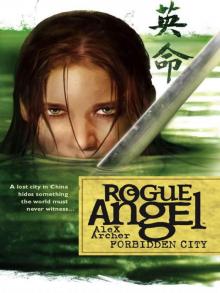 Rogue Angel: Forbidden City
Rogue Angel: Forbidden City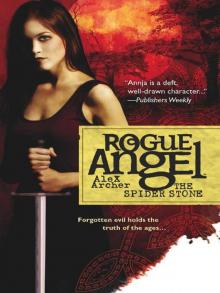 The Spider Stone
The Spider Stone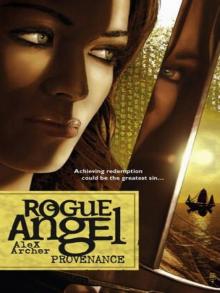 Provenance
Provenance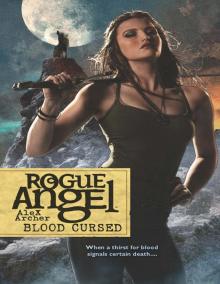 Blood Cursed
Blood Cursed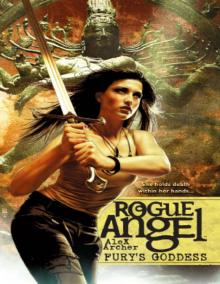 Fury's Goddess
Fury's Goddess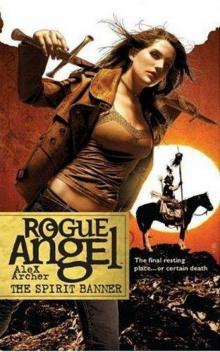 The Spirit Banner
The Spirit Banner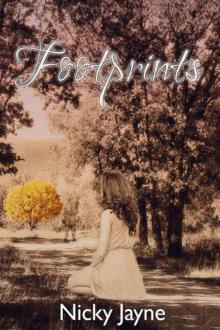 Footprints
Footprints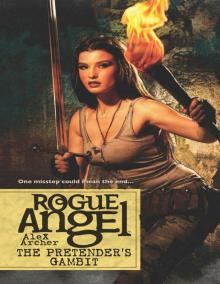 The Pretender's Gambit
The Pretender's Gambit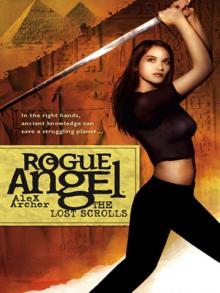 Rogue Angel: The Lost Scrolls
Rogue Angel: The Lost Scrolls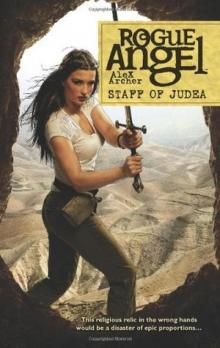 Staff of Judea
Staff of Judea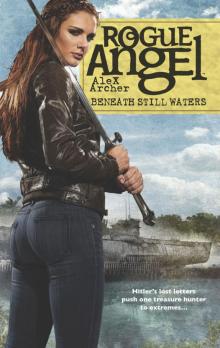 Rogue Angel 55: Beneath Still Waters
Rogue Angel 55: Beneath Still Waters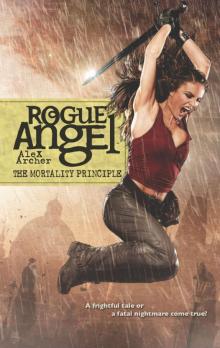 The Mortality Principle
The Mortality Principle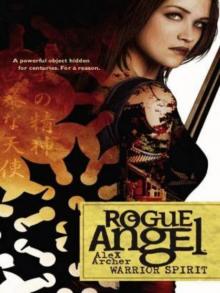 Warrior Spirit
Warrior Spirit Paradox
Paradox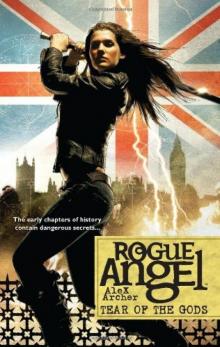 Tear of the Gods
Tear of the Gods Forbidden City
Forbidden City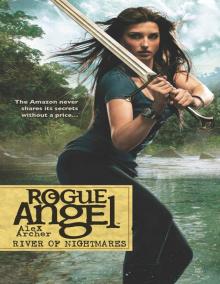 River of Nightmares (Rogue Angel)
River of Nightmares (Rogue Angel)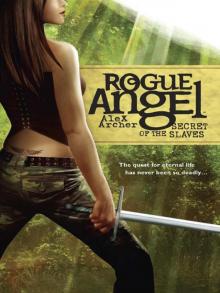 Rogue Angel: The Secret of the Slaves
Rogue Angel: The Secret of the Slaves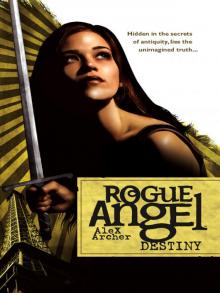 Destiny
Destiny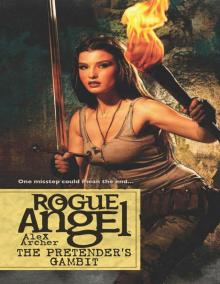 Rogue Angel 51: The Pretender's Gambit
Rogue Angel 51: The Pretender's Gambit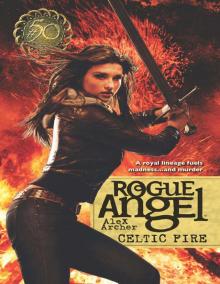 Celtic Fire
Celtic Fire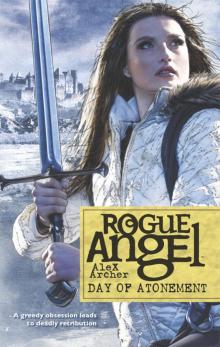 Rogue Angel 54: Day of Atonement
Rogue Angel 54: Day of Atonement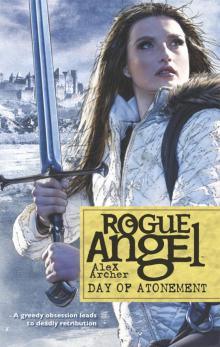 Day of Atonement
Day of Atonement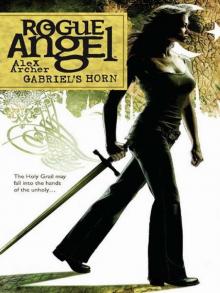 Rogue Angel: Gabriel's Horn
Rogue Angel: Gabriel's Horn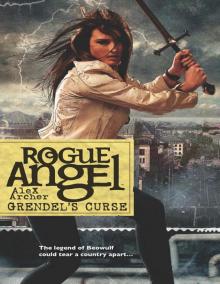 Grendel's Curse
Grendel's Curse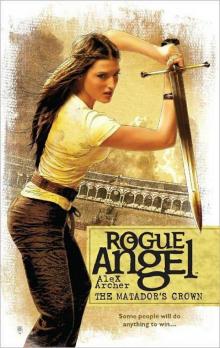 The Matador's Crown
The Matador's Crown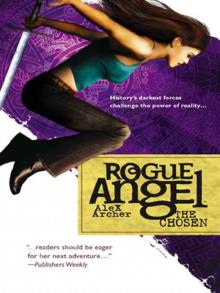 Rogue Angel: The Chosen
Rogue Angel: The Chosen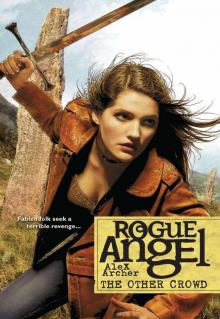 The Other Crowd
The Other Crowd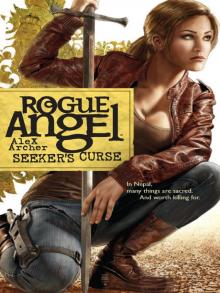 Seeker’s Curse
Seeker’s Curse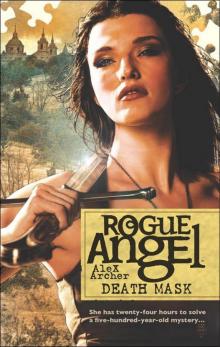 Rogue Angel 52: Death Mask
Rogue Angel 52: Death Mask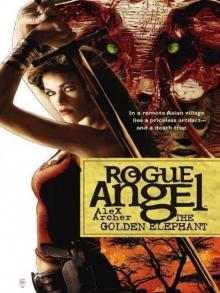 The Golden Elephant
The Golden Elephant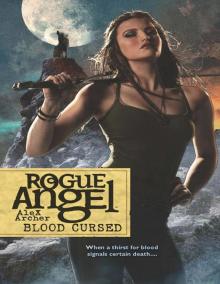 Blood Cursed (Rogue Angel)
Blood Cursed (Rogue Angel)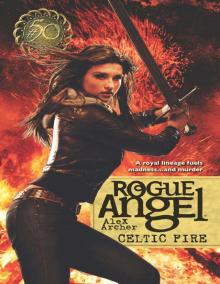 Celtic Fire (Rogue Angel)
Celtic Fire (Rogue Angel)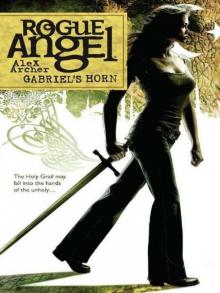 Gabriel's Horn
Gabriel's Horn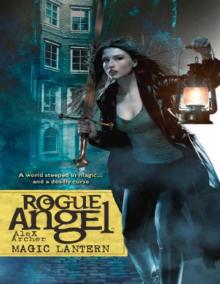 Magic Lantern (Rogue Angel)
Magic Lantern (Rogue Angel)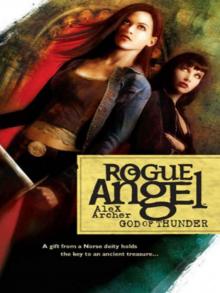 God of Thunder
God of Thunder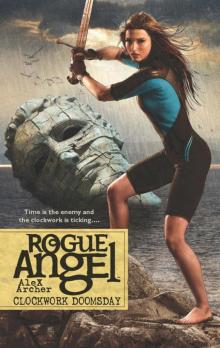 Clockwork Doomsday
Clockwork Doomsday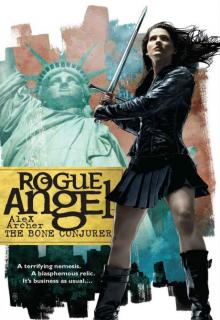 The Bone Conjurer
The Bone Conjurer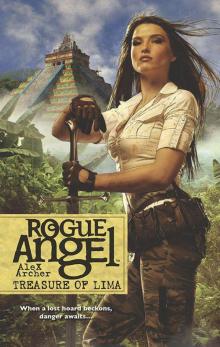 Treasure of Lima
Treasure of Lima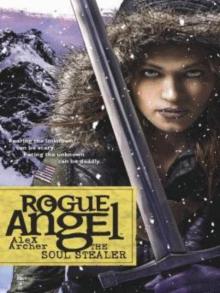 The Soul Stealer
The Soul Stealer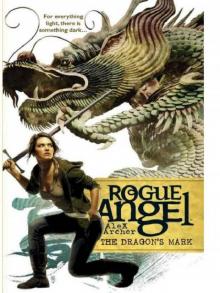 The Dragon’s Mark
The Dragon’s Mark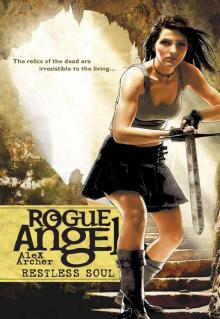 Restless Soul
Restless Soul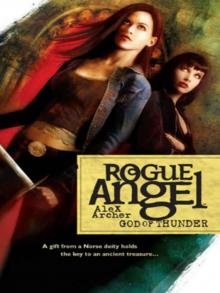 Rogue Angel: God Of Thunder
Rogue Angel: God Of Thunder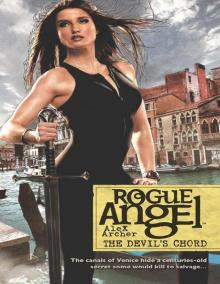 Rogue Angel 49: The Devil's Chord
Rogue Angel 49: The Devil's Chord Death Mask
Death Mask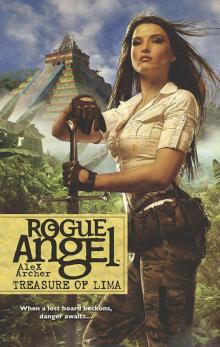 Rogue Angel 46: Treasure of Lima
Rogue Angel 46: Treasure of Lima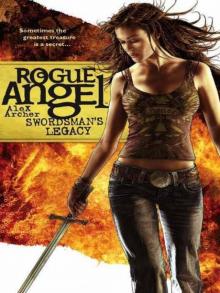 Swordsman's Legacy
Swordsman's Legacy The Oracle's Message
The Oracle's Message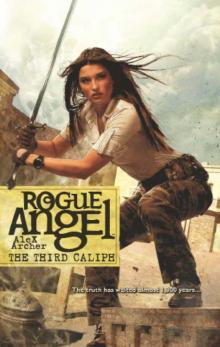 The Third Caliph
The Third Caliph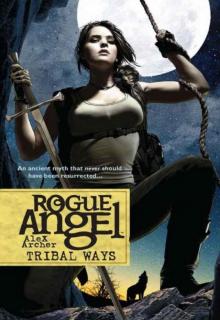 Tribal Ways
Tribal Ways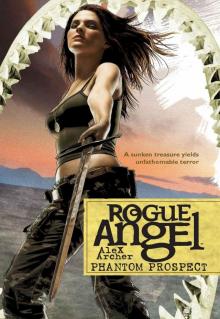 Phantom Prospect
Phantom Prospect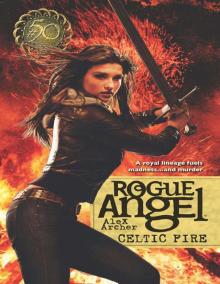 Rogue Angel 50: Celtic Fire
Rogue Angel 50: Celtic Fire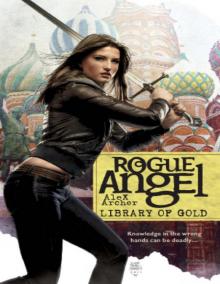 Library of Gold
Library of Gold Rogue Angel 53: Bathed in Blood
Rogue Angel 53: Bathed in Blood Sacred Ground
Sacred Ground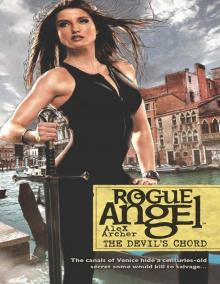 The Devil's Chord
The Devil's Chord Serpent's Kiss
Serpent's Kiss The Vanishing Tribe
The Vanishing Tribe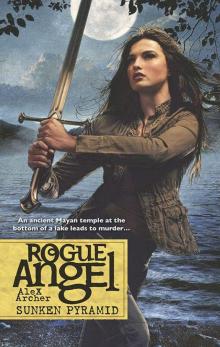 Sunken Pyramid
Sunken Pyramid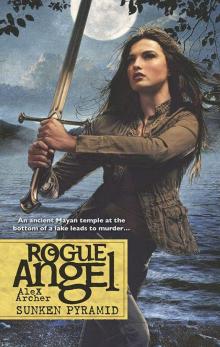 Sunken Pyramid (Rogue Angel)
Sunken Pyramid (Rogue Angel)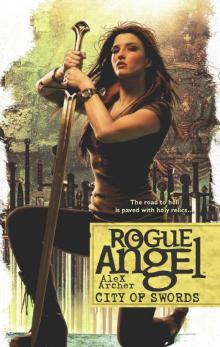 City of Swords
City of Swords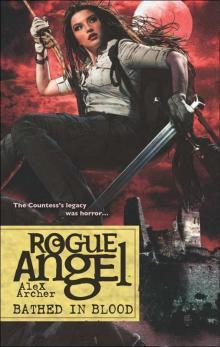 Bathed in Blood
Bathed in Blood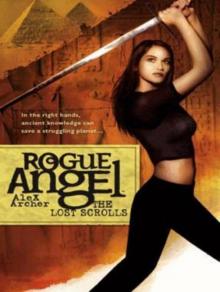 The Lost Scrolls
The Lost Scrolls The Babel Codex
The Babel Codex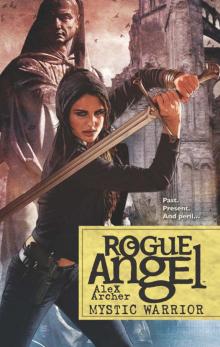 Mystic Warrior
Mystic Warrior Eternal Journey
Eternal Journey Beneath Still Waters
Beneath Still Waters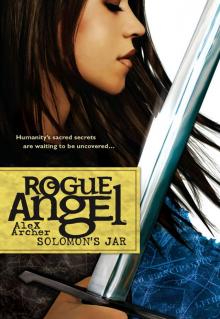 Solomon's Jar
Solomon's Jar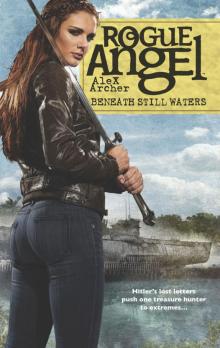 Beneath Still Waters (Rogue Angel Book 55)
Beneath Still Waters (Rogue Angel Book 55) Cradle of Solitude
Cradle of Solitude Secret of the Slaves
Secret of the Slaves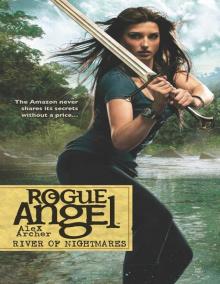 River of Nightmares
River of Nightmares Polar Quest
Polar Quest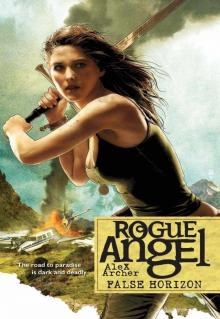 False Horizon
False Horizon